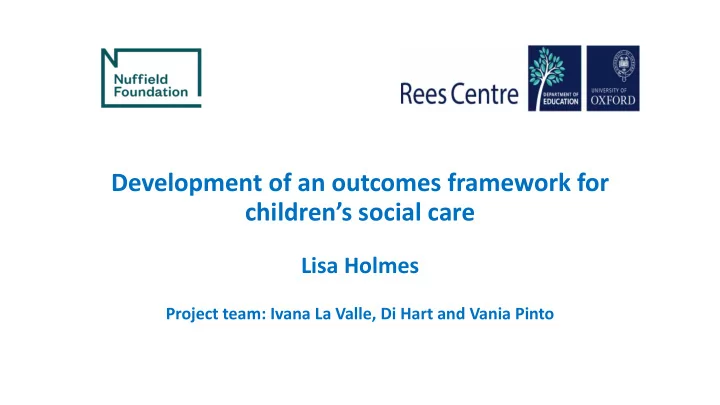

Development of an outcomes framework for children’s social care Lisa Holmes Project team: Ivana La Valle, Di Hart and Vania Pinto
The study • Development of an outcomes framework for children’s social care: to provide better evidence for those planning and delivering the service • It is designed to complement, not replace, existing data collection • Developed using a bottom-up approach, based on consultations with local authority staff and children/ families as well as existing evidence • Funded by the Nuffield Foundation • Build on our earlier feasibility study published in 2016
The methods • Summary of methods • Rapid evidence review • Including policy documents, grey literature and published research studies • Four in-depth case studies • Focus groups and interviews with managers, practitioners and performance management teams (n=37 focus group participants and 13 interviews) • Consultation with children, young people, families and carers • 17 young people • 33 parents/carers (including foster carers) • Workshops • 10 workshops with LGA, ADCS, DfE and other national and regional groups
How children’s social care can make a difference Socio-economic and Corporate commitment Role of other agencies cultural context and support for CSC Children in need: Relationship based CSC reach children - Are safe where they practice that values and families who need live Leaders create the children and families - Are supported to be conditions and culture support and offer and involves them in heathy and happy that support good them the level of - Are supported to identifying the social work practice support they are enjoy and progress in support they need entitled to education Learning from the experiences of staff, children and families
‘Snapshot’ and trend Data about the data on organisation, cohort of service workforce and Four types of users practice data to measure intermediate Data on users’ views and child Data on progress of and experience of outcomes individual children services and re: safety, self-reported wellbeing, healthy impacts development and education
Intermediate outcomes
The ‘right’ conditions and culture Culture that Commitment to SW Effective leadership supports reflective values and ethics learning Shared Effective multi- Adequate support understanding of agency working infrastructure good practice Stable workforce at Workforce with the Motivated workforce all levels right skills
Services reach children and families who need help Partner agencies are Effective Effective able to identify identification of identification of children who are children at risk of children in need potentially in need harm Effective Care leavers remain identification of Level of support in contact and children who is appropriate to continue to receive cannot be cared for meet a child’s needs support safely at home
Children and families are valued and involved Children trust staff Children think Children involved in and have a stable services are identifying their and supportive responding to their needs and planning relationship with needs their support them Parents/carers trust P arents/carers staff and have a Parents/carers think involved in stable and services are identifying their supportive responding to their needs and planning relationship with needs their support them
Child outcomes
Children Are settled and Are safe where they Achieve stability and happy where they live permanence live Engage in early Have a healthy Have their mental education development health needs met Have stable and Make good progress Engage in education positive educational in education experiences
Making sense of the data • Robust statistical evidence to challenge assessments based on data which do not measure child outcomes nor important intermediate outcomes • Triangulation : none of the statistics that can be developed from the framework are designed to be used in isolation. No single statistic can capture the complexity in which children’s social care operate and the support they deliver to some of the most vulnerable children and families in our society • Capacity and capability building at the local, regional and national level, with mechanisms for shared learning and analysis
Making sense of the data – some examples • Analysis can raise important questions about the role of partner agencies • Data on outcomes could be linked to financial data • Explore the influence of socio, economic, demographic and cultural factors • Explore outcomes for children with different needs and accessing different services • Benchmarking to get a sense of what kind of improvements local CSCS should expect if their involvement has worked • Assess CSCS performance at different stages of their improvement journey
Project report La Valle I, Hart D, Holmes L with Pinto V How do we know if children’s social care services make a difference? Development of an outcomes framework http://www.education.ox.ac.uk/research/measuring-outcomes-for- childrens-social-care-services/ Email: rees.centre@education.ox.ac.uk Twitter: @ReesCentre
Recommend
More recommend